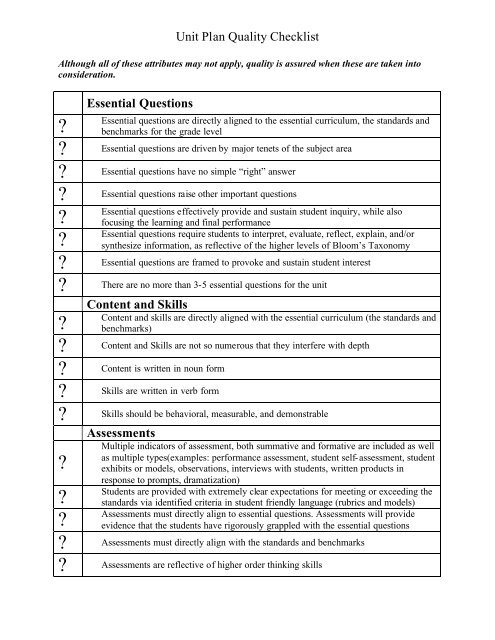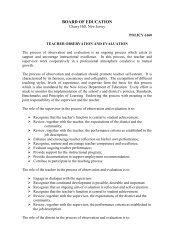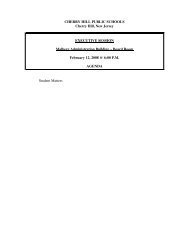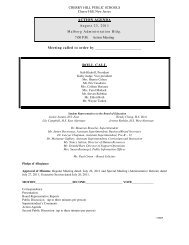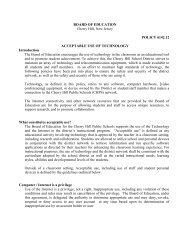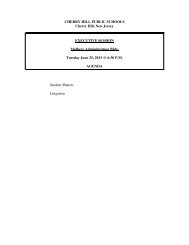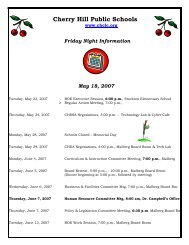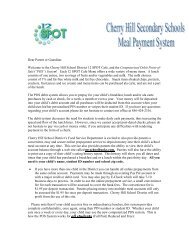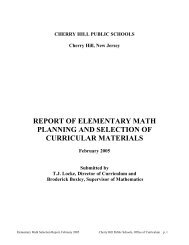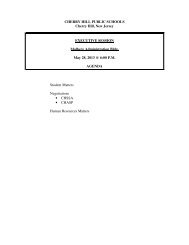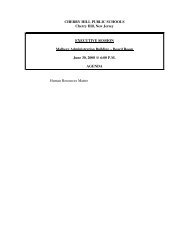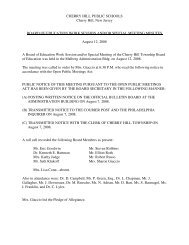Unit Quality Checklist
Unit Quality Checklist
Unit Quality Checklist
Create successful ePaper yourself
Turn your PDF publications into a flip-book with our unique Google optimized e-Paper software.
<strong>Unit</strong> Plan <strong>Quality</strong> <strong>Checklist</strong><br />
Although all of these attributes may not apply, quality is assured when these are taken into<br />
consideration.<br />
Essential Questions<br />
?<br />
? Essential questions are driven by major tenets of the subject area<br />
? Essential questions have no simple “right” answer<br />
Essential questions are directly aligned to the essential curriculum, the standards and<br />
benchmarks for the grade level<br />
? Essential questions raise other important questions<br />
Essential questions effectively provide and sustain student inquiry, while also<br />
? focusing the learning and final performance<br />
Essential questions require students to interpret, evaluate, reflect, explain, and/or<br />
? synthesize information, as reflective of the higher levels of Bloom’s Taxonomy<br />
? Essential questions are framed to provoke and sustain student interest<br />
? There are no more than 3-5 essential questions for the unit<br />
Content and Skills<br />
?<br />
? Content and Skills are not so numerous that they interfere with depth<br />
? Content is written in noun form<br />
? Skills are written in verb form<br />
? Skills should be behavioral, measurable, and demonstrable<br />
?<br />
Content and skills are directly aligned with the essential curriculum (the standards and<br />
benchmarks)<br />
Assessments<br />
Multiple indicators of assessment, both summative and formative are included as well<br />
as multiple types(examples: performance assessment, student self-assessment, student<br />
exhibits or models, observations, interviews with students, written products in<br />
response to prompts, dramatization)<br />
Students are provided with extremely clear expectations for meeting or exceeding the<br />
?<br />
?<br />
? Assessments must directly align with the standards and benchmarks<br />
? Assessments are reflective of higher order thinking skills<br />
standards via identified criteria in student friendly language (rubrics and models)<br />
Assessments must directly align to essential questions. Assessments will provide<br />
evidence that the students have rigorously grappled with the essential questions
?<br />
?<br />
<strong>Unit</strong> Plan <strong>Quality</strong> <strong>Checklist</strong><br />
Assessments should provide challenge for all students, including those who master<br />
material quickly<br />
Consideration is given to students who may need multiple opportunities to reach the<br />
standard<br />
? Opportunity is provided for quality student self-assessment<br />
Instructional Lessons and Activities<br />
?<br />
?<br />
Targeted learning objectives are clearly defined, well articulated, and aligned with the<br />
unit’s standards and benchmarks<br />
Includes well defined accommodations for how the objectives can be both extended<br />
and supported (differentiated)<br />
? Activities noted for high student engagement<br />
The Principles of Learning are integrated into the unit, with focus on academic rigor,<br />
? accountable talk, and self-management of learning<br />
? Lessons and activities must directly align with the standards and benchmarks<br />
? Activities help students address the essential questions in meaningful ways<br />
? Lessons and activities should be closely aligned with the assessments<br />
? Activities make use of high quality, supportive materials<br />
? Technology is integrated when appropriate and serves to advance the learning


